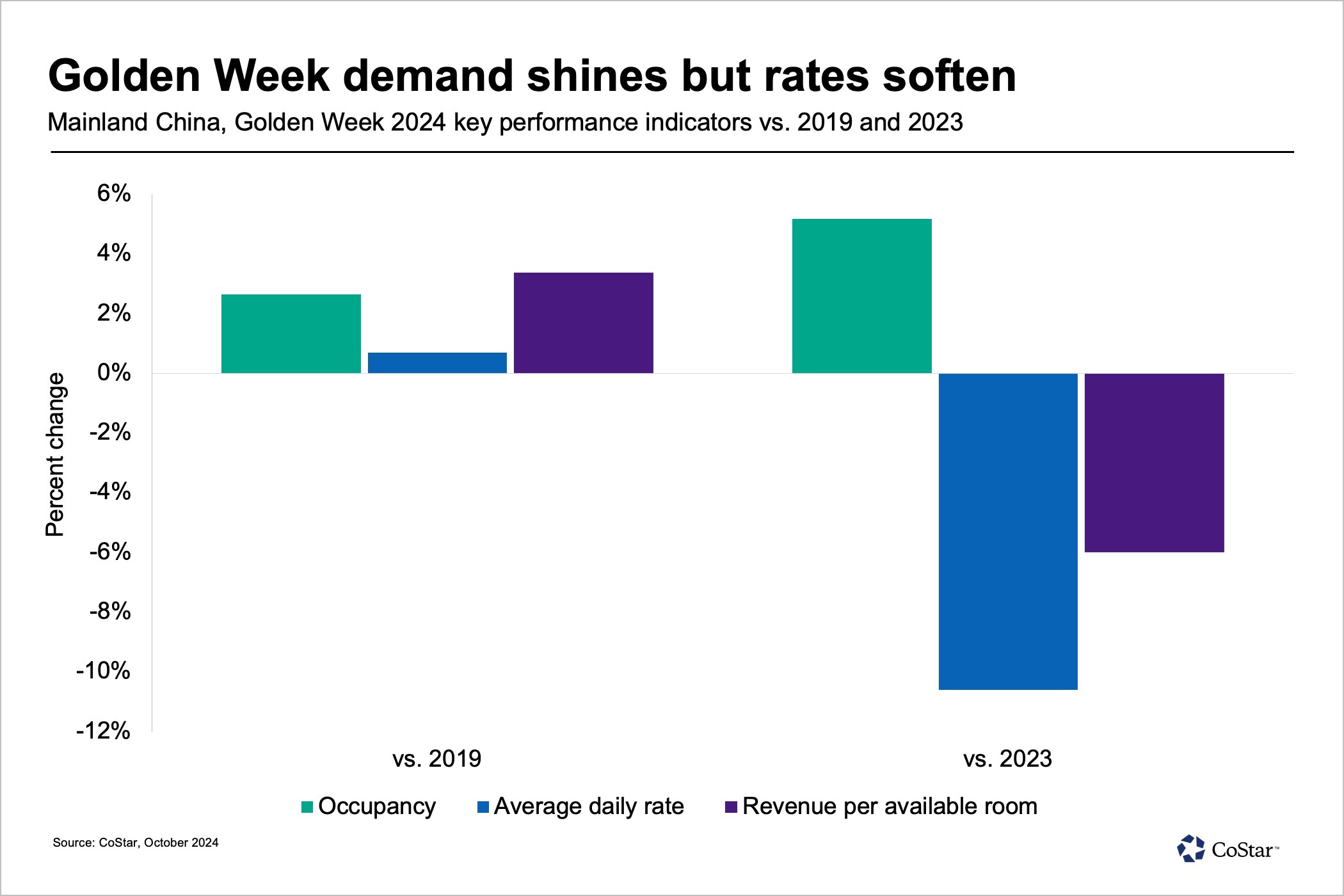SINGAPORE — China remains the domino in the Asia-Pacific region that can fall any number of ways, influencing future travel patterns.
But other countries continue to pivot as China recovers, and hoteliers are noticing Chinese demand patterns changing along the way.
“Is the Chinese economy collapsing? No, it is not,” said Jesper Palmqvist, regional vice president for STR at the Hotel Investment Conference Asia-Pacific. “China has proven they can turn things around quickly.”

Thanks to recent economic stimulus efforts and solid Golden Week travel activity in early October, optimism is on the upswing. And while outbound travel is not where it was, hoteliers from surrounding countries are hopeful that wave of Chinese travelers will return.
Paitoon Wongsasutthikul, chief investment officer of real estate investor and developer Asset World, said the number of Chinese travelers coming to Thailand this year is only about 50% to 60% of what it was pre-pandemic.
“But Thailand is a destination. This year we are expecting the inbound tourism number to be around 35 [million] to 36 million,” he said. “In 2019 that was about 40 million, so we’re getting close.”
One trend many HICAP speakers brought up is that as Chinese outbound travel recovers, it won’t necessarily look the same as it did pre-pandemic, with large tour groups going to “typical” tourist locations.
“Not all Chinese tourists are created equal,” Wongsasutthikul said. “We see more and more Chinese people traveling for experiences, and they’re ready to spend. We are seeing Chinese tourists exploring dining out at Michelin-starred restaurants, at rooftops.
“There are many opportunities with the different groups of Chinese travelers coming,” he said. “You’ll see more and more looking for this type of different experience.”
Japan strong
Japan's hotels continue to lead the APAC region in average daily rate growth, according to CoStar hospitality data.

“Inbound travel to Japan is expected to be about 35 million people, which is a record high,” said Yoshiki Kaneda, president and CEO of Seibu Prince Hotels & Resorts. “The growth has been driven not by occupancy but by rate. We still have a lot of opportunity, which is a good problem to have.”
Hotel investors are focused on Japan as well, though it’s highly competitive, said Hoe Kit Mak, managing director of Lodging Private Equity Fund for CapitaLand.
“Everyone loves Japan for business, for holidays, for scenery, for food, for the low-interest-rate environment,” he said. “For all those reasons, it’s a key market for us for investment.”
But he underlined that competition is tough.
“It’s loved by everybody so pricing is very tight,” Mak said. “You have to be able to assess whether the price works for you, notwithstanding a low-interest-rate environment. We’re still looking to do more there, but we have to be prepared to roll up our sleeves and add additional value.”
Indonesia, Maldives and Thailand
Indonesia is another country that has experienced big growth this year, but Palmqvist warned that like in Japan, the big growth in Indonesia “every month slows down and normalizes.”
Also like Japan, Indonesia’s hotel revenue per available room gains have been driven by ADR.
On the other hand, other countries in the region notching notable performance — Vietnam and the Maldives — have been driven by occupancy gains, Palmqvist said.
Angeline Tan, senior vice president of SingHaiyi Hospitality, which operates the Momentus Hotels & Resorts brand, said the Maldives are a key market for her company. The islands see a lot of demand, but hospitality projects require a lot of work, particularly to ensure sustainable building.
SingHaiyi owns two resorts in the Maldives and is building a Hyatt Regency set to open in 2027.
Branded hotels are coming into Thailand rapidly, Palmqvist said.
Wongsasutthikul’s Asset World has 23 hotels across Thailand, most branded under Marriott International, Hilton and IHG brands.
“RevPAR is higher at our hotels than it was pre-COVID, and ADR is way above 2019 levels,” he said. “We’re still missing a little occupancy in cities like Bangkok, but Phuket and Samui are already above pre-COVID levels.”


